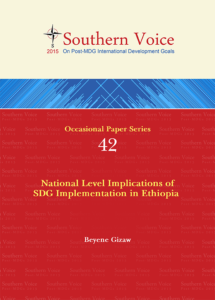 Countries around the world have taken a number of lessons from the challenges they faced while implementing the Millennium Development Goals (MDGs). These lessons added significant value while designing the Sustainable Development Goals (SDGs). Like other countries, Ethiopia has prepared a medium-term plan – the Second Growth and Transformation Plan (GTP II), covering the period from 2015 to 2020 – which forms an integral part of the country’s post-2015 development agenda. The present study investigates the implications of implementing the SDGs in Ethiopia, focusing on identifying potential implementation challenges at the national level. It aims at articulating the framework that national stakeholders will need to undertake in order to implement the SDGs in the country. It conducted a rigorous review of documents and interviews with relevant stakeholders to assess the challenges of implementing the SDGs within the context of GTP II. It finds that capacity limitations, financial shortages and the weak policy environment, including leadership, coordination and management challenges, are the most critical factors. It will take concerted efforts on the part of the government, the donor community, civil society organisations (CSOs) and the private sector to resolve these issues, and increase Ethiopia’s ability to implement the new development agenda effectively.
Countries around the world have taken a number of lessons from the challenges they faced while implementing the Millennium Development Goals (MDGs). These lessons added significant value while designing the Sustainable Development Goals (SDGs). Like other countries, Ethiopia has prepared a medium-term plan – the Second Growth and Transformation Plan (GTP II), covering the period from 2015 to 2020 – which forms an integral part of the country’s post-2015 development agenda. The present study investigates the implications of implementing the SDGs in Ethiopia, focusing on identifying potential implementation challenges at the national level. It aims at articulating the framework that national stakeholders will need to undertake in order to implement the SDGs in the country. It conducted a rigorous review of documents and interviews with relevant stakeholders to assess the challenges of implementing the SDGs within the context of GTP II. It finds that capacity limitations, financial shortages and the weak policy environment, including leadership, coordination and management challenges, are the most critical factors. It will take concerted efforts on the part of the government, the donor community, civil society organisations (CSOs) and the private sector to resolve these issues, and increase Ethiopia’s ability to implement the new development agenda effectively.
Author: Beyene Gizaw

